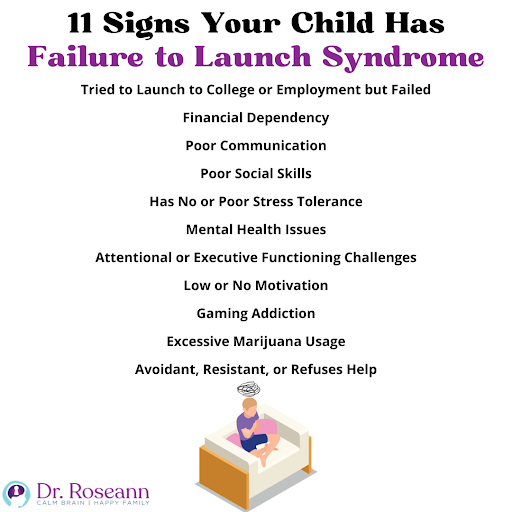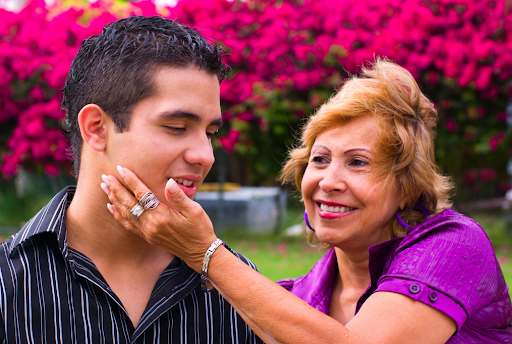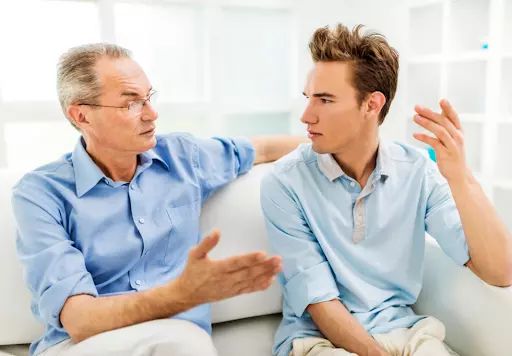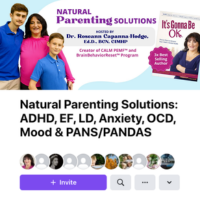Failure to Launch Syndrome (FLS) is when young adults either are unwilling or incapable of leaving their home and being self-sufficient or independent in the world. These young adults who are living at home with their parents struggle to get a job, go to college, or have adult relationships.
Mental Health and Adult Child Syndrome
Often, young adults with failure to launch syndrome have underlying mental health issues that make leaving home, dealing with failure, frustration, and stress a challenge.
These emerging adults present with a lack of motivation and what appears to be a general apathy that is a source of conflict at home. Not knowing what else to do, parents often push these young people to “get a job” with the belief that will get them unstuck.
The real focus needs to be on addressing the mental health disorders that are fueling the adult child issues. For those young persons suffering from failure to launch, when we look back, there is always a pattern of long-term issues and often mental illness that have interfered with academic success, relationships and communication, and stress management.
High School, College and Failure to Launch Young Adults
These minor issues can increase in high school when more academic independence is needed but also can be masked with school support through an IEP program or 504 accommodation support. These helpful and necessary supports help teens do better in high school but parents often don’t fully understand how reliant their child is on academic support nor do they understand what supports are needed for college.
When the young adult struggles in college, it often is a surprise for family members because of the “good grades” they obtained in high school. Having the right support in college or a training program is imperative for success.
Understanding the signs of Failure to Launch Syndrome is a critical first step for parents who want to help their adult child who is unmotivated, stuck, and maybe even just sitting in their room.

11 Signs of Failure to Launch Syndrome
Tried to Launch to College or Employment but Failed
Young adults who have underlying mental health issues that haven’t received the right treatment often really show their difficulties when they try to transition to adulthood.. Moreover, for those teens who have had a lot of academic and social support who suddenly don’t at their work or school, often fail to be successfully independent. These emerging adults frequently shut down and retreat to their parent’s home.
Financial Dependency
Naturally, adult kids that don’t launch need financial support from their parents. Parents continue caring for their adult child in the same way they did before they turned 18. Financial dependency can be another major source of friction.
Poor Communication
FLS young adults typically have a history of poor communication skills. These poor communication skills are observable in when and how they manage stress, as you can see withdrawn behavior or irritated or stressed communication.
Poor Social Skills
Many FLS adult children have a history of peer social relation difficulties. These often bright kids are inwardly focused and struggle with communicating in an age appropriate way with peers or lack interest in connecting socially. When someone has social skill deficits, understanding the nuances of reciprocal relationships often feels foriegn to them so they avoid socialization all together.
Has No or Poor Stress Tolerance
A resilience mindset™ is how you view, manage and recover from stress and adult kids with FLS often have a history of poor stress tolerance and lack resiliency. Resilience is built every time one faces a stressor and learns to both tolerate it and gain those all important coping and problem-solving skills. Building coping skills is a key component of our BrainBehaviorReset™ Program designed to help failure to launch young adults and their families.
Mental Health Issues
Whether the FLS adult has a clinical mental health diagnosis or not, every young adult struggling with failure to launch has an underlying mental health issue. Chronic stress and shame takes its toll on mental health and no person with FLS can move forward without first addressing mental health. You can’t expect your adult child to just get a job or make it in college without calming the brain and teaching them skills that change their behavior and that is what our innovative BrainBehaviorReset™ Program is all about.
Attentional or Executive Functioning Challenges
When you are struggling to launch in the world, then you can’t see a future outcome and all those little micro-steps to get there. They lack the future thinking skills that come with good executive functioning. The good news is that executive functioning skills can be learned with direct teaching and reinforcement. It is important for parents to understand executive functioning and how it is different from ADHD, so they can help their adult child build skills.
Low or No Motivation
Weak executive functioning and mental health issues often zap the motivation of failure to launch adults. Parents often express frustration with their “lazy”, “unfocused” and “unwilling” young adults who are just too comfortable living with their parents. At our center, understanding the root causes of why their child can’t launch with a diagnostic QEEG brain map is a wonderful tool for the family to reset the brain and behavior.
Gaming Addiction
ADHD and executive functioning challenges is a common feature of FLS, which means they have an understated brain and video games are designed to give constant stimulation to the brain. It is pretty easy to get lost in gaming when you have an understimulated brain, which is why our failure to launch clients use neurofeedback to improve attention and executive functioning.
Excessive Marijuana Usage
When we experience a problem or stressor, we can either approach it with healthy tools or unhealthy behaviors and over relying on marijuana to deal with stress isn’t healthy. When people get stuck, it means that they can’t see the solution. These adult kids overuse marijuana because they don’t know what to do to get unstuck and disconnecting with substances is a lot easier.
Avoidant, Resistant or Refuses Help
Parents call our Ridgefield, CT center from all over the United States and a common thread is that parents are desperate to help their FLS kid but their adult child refuses help. When someone struggles to transition and is stuck, there is a lot of shame behind their behavior, which can be quite embolizing.
Adolescence and Adult Child Syndrome
Transitioning from adolescence to adulthood presents unique challenges, particularly for those grappling with Adult Child Syndrome, often observed in adult children of alcoholics. This syndrome can manifest in various ways, including an inability or reluctance to embrace adult responsibilities—a phenomenon akin to Peter Pan Syndrome. Like the fictional Peter Pan, who never grows up, these individuals may struggle to leave the comforts of their childhood home, leading to situations labeled as Failure to Launch.
Peter Pan Syndrome, while not a clinically recognized disorder, effectively captures the essence of this reluctance. It's characterized by an avoidance of adult responsibilities and a desire to remain in the adolescent stage. This syndrome can be particularly pronounced in adult children of alcoholics, who may have grown up in environments where mature emotional development was stifled.
The challenge for these individuals is not just about “growing up” in a physical sense but also about developing emotional maturity. The term “manchild” is often colloquially used to describe someone who has grown physically but not emotionally. For many, the concept of growing up brings a fear of losing the carefree nature of childhood, as depicted in the story of Peter Pan, and facing the realities of adult life.
Strategies for Growing Up
In a world where the lines between adolescence and adulthood are often blurred, many young adults find themselves in a limbo, akin to the eternal youth of Peter Pan. This phenomenon, frequently referred to as “Failure to Launch” or “Peter Pan Syndrome,” is not just a cultural trope but a real challenge faced by many individuals, particularly those labeled as “adult children.” The journey to adulthood is marked by various milestones—financial independence, emotional maturity, and the ability to handle life's stressors. However, for some, this transition is fraught with obstacles, much like the challenges faced by Wendy in “Peter Pan and Wendy.”
The term “growing up” means more than just physical aging; it's about embracing the responsibilities and complexities of adult life. This process can be particularly daunting for those who, like the fictional Peter Pan, wish to never grow up, or for adult children of alcoholics who might have faced unique challenges in their developmental years. The resistance to maturing, often dubbed as ‘Peter Pan Syndrome' or ‘Failure to Launch,' can manifest in various forms: financial dependency, reluctance to leave the parental home, or a general lack of motivation often associated with the ‘manchild' phenomenon.
In this context, the ‘Strategies for Growing Up' section aims to provide practical advice and insights for navigating the challenging waters of adulthood. This guide will touch upon various aspects, from overcoming the ‘fear of growing up'—a sentiment echoed in the book “I Don't Want to Grow Up”—to addressing specific challenges like ‘Peter Pan Syndrome' in both males and females, and the broader implications of ‘growing up meaning' in today's world.
Parents grappling with these issues need actionable steps for their families, drawing from resources like ‘Failure to Launch programs near me' and insights into ‘how to help an adult child with depression.'
Through this comprehensive approach, we hope to shed light on the complex journey from adolescence to adulthood. Whether it's understanding the nuances of ‘Peter Pan meaning' in a psychological context, dealing with ‘adult children living at home,' or simply defining what it means to ‘grow up,' our goal is to provide a roadmap for navigating these transformative years.
Seeking Guidance: Engaging with resources like the “I Don't Want to Grow Up” book or attending adult children of alcoholics meetings can provide valuable insights and strategies.
Setting Personal Goals: Developing a clear sense of direction can help in transitioning to adulthood. This involves setting achievable goals, both short-term and long-term.
Learning Financial Independence: Taking steps towards financial responsibility is a crucial aspect of growing up. This can include budgeting, saving, and understanding the value of money.
Building Emotional Resilience: Developing coping mechanisms for stress and emotional challenges is essential. This might involve therapy, mindfulness practices, or joining support groups.
Addressing Fear of Growing Up
House Rules for Adult Children Living at Home
Navigating the dynamics of adult children living at home can be a complex and nuanced experience, often reminiscent of the intricate relationships portrayed in “Peter Pan and Wendy.” This situation, sometimes arising from ‘Failure to Launch' or ‘Peter Pan Syndrome,' creates a unique set of challenges for families. It calls for a thoughtful approach, much like the strategy needed when considering ‘how to deal with a disrespectful grown son' or ‘how to help an adult child with depression.'
Establishing a clear set of house rules becomes essential in maintaining harmony and respect within the household. This approach is not just about laying down the law; it's about fostering an environment where adult children, who may still be grappling with issues akin to ‘Peter Pan down syndrome' or ‘upsyndrome,' can grow, develop, and eventually transition into full independence.
The section on “House Rules for Adult Children Living at Home” aims to provide families with practical guidelines and a framework that respects both the autonomy of the adult child and the needs of the family unit, ensuring that the home does not feel like ‘Neverland' where time and responsibilities stand still.
Contribute to Household Chores: Assign specific tasks to ensure everyone participates in maintaining the home.
Respect Boundaries: Establish clear boundaries regarding privacy and personal space.
Financial Contributions: If possible, adult children should contribute financially to household expenses.
Set Goals for Independence: Encourage setting realistic goals for moving towards independence.
The Intersection of Mental Health and Failure to Launch
Mental health plays a critical role in conditions like Peter Pan Syndrome and Failure to Launch. It's essential to recognize that these are not just behavioral issues but can be deeply rooted in psychological challenges. Mental health disorders, such as autism, anxiety, depression, or even more complex issues like PDA, DID syndrome or age regression symptoms, can significantly hinder an individual's ability to take on adult responsibilities.
Treatment often involves a combination of therapy, medication (if necessary), and support groups. Innovative programs focused on mental health, like the BrainBehaviorReset™ Program, can offer holistic approaches to treatment. The key is to approach treatment with empathy, understanding that growing up is not just a physical process but also an emotional and psychological journey.
How to Help Your Adult Child With Anxiety or Depression
Getting to the bottom of the underlying issues is the first step to addressing their stuck behaviors and their inability to launch. Parents often fall into the trap of trying to push their kids to launch without giving their adult kids the tools to manage stress and mental health.

Without good coping and executive functioning skills, adult failure to launch children will avoid, resist or refuse help. In our unique BrainBehaviorReset™ Program, when an adult child won’t participate in therapy, we begin with giving parents the tools they need to address the stuck behaviors and manage their own frustration and fears.
Our program incorporates brain tools such as supplements, nutrition, neurofeedback, PEMF and therapy.
Citations:
Merikangas, K. R., He, J. P., Burstein, M., Swanson, S. A., Avenevoli, S., Cui, L., Benjet, C., Georgiades, K., & Swendsen, J. (2010). Lifetime prevalence of mental disorders in U.S. adolescents: results from the National Comorbidity Survey Replication–Adolescent Supplement (NCS-A). Journal of the American Academy of Child and Adolescent Psychiatry, 49(10), 980–989. https://doi.org/10.1016/j.jaac.2010.05.017
Mogel, W. (2001). The Blessing of a Skinned Knee: Using Timeless Teachings to Raise Self-Reliant Children. Scribner.
Vespa, J. (2017). Jobs, Marriage and Kids Come Later in Life. US Census. https://www.census.gov/library/stories/2017/08/young-adults.htm
Dr. Roseann Capanna-Hodge is a mental health expert that is frequently featured in the media:
- The Healthy: Adult ADHD Symptoms
- Very Well Mind New Research Highlights Key Differences Among Autistic Boys and Girls
- Healthline Understanding Self-Regulation Skills
- CBS2 New York (Article) Experts Offer Tips On How To Help Children Deal With Anxiety.
Always remember… “Calm Brain, Happy Family™”
Are you looking for SOLUTIONS for your struggling child or teen?
Dr. Roseann and her team are all about solutions, so you are in the right place!
There are 3 ways to work with Dr. Roseann:
Dr. Roseann is a Children’s Mental Health Expert and Licensed Therapist who has been featured in/on hundreds of media outlets including The Mel Robbins Show, CBS, NBC, PIX11 NYC, Today, FORBES, CNN, The New York Times, The Washington Post, Business Insider, Women’s Day, Healthline, CNET, Parade Magazine and PARENTS. FORBES called her, “A thought leader in children’s mental health.”
She coined the terms, “Re-entry panic syndrome” and “eco-anxiety” and is a frequent contributor to media on mental health.
Dr. Roseann Capanna-Hodge has three decades of experience in working with children, teens and their families with attention-deficit hyperactivity disorder (ADHD), autism, concussion, dyslexia and learning disability, anxiety, Obsessive Compulsive Disorder (OCD), depression and mood disorder, Lyme Disease, and PANS/PANDAS using science-backed natural mental health solutions such as supplements, magnesium, nutrition, QEEG Brain maps, neurofeedback, PEMF, psychotherapy and other non-medication approaches.
She is the author of three bestselling books, It’s Gonna Be OK!: Proven Ways to Improve Your Child's Mental Health, The Teletherapy Toolkit, and Brain Under Attack. Dr. Roseann is known for offering a message of hope through science-endorsed methods that promote a calm brain.
Her trademarked BrainBehaviorResetⓇ Program and It’s Gonna be OK!Ⓡ Podcast has been a cornerstone for thousands of parents facing mental health, behavioral or neurodevelopmental challenges.
She is the founder and director of The Global Institute of Children’s Mental Health, Neurotastic™Brain Formulas and Dr. Roseann Capanna-Hodge, LLC. Dr. Roseann is a Board Certified Neurofeedback (BCN) Practitioner, a Board Member of the Northeast Region Biofeedback Society (NRBS), Certified Integrative Mental Health Professional (CIMHP) and an Amen Clinic Certified Brain Health Coach. She is also a member of The International Lyme Disease and Associated Disease Society (ILADS), The American Psychological Association (APA), Anxiety and Depression Association of America (ADAA) National Association of School Psychologists (NASP), International OCD Foundation (IOCDF).
© Roseann-Capanna-Hodge, LLC 2023
Disclaimer: This article is not intended to give health advice and it is recommended to consult with a physician before beginning any new wellness regime. *The effectiveness of diagnosis and treatment vary by patient and condition. Dr. Roseann Capanna-Hodge, LLC does not guarantee certain results.













